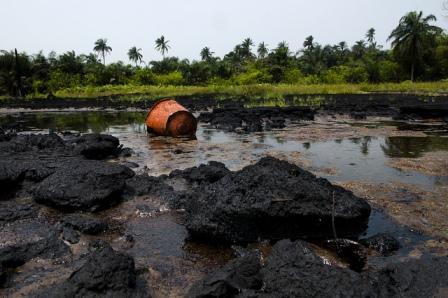Nigeria’s government and Royal Dutch Shell Plc (RDSA) have failed to act on a United Nations 2011 report on oil pollution in Ogoniland in the Niger delta, according to an Amnesty International joint assessment.
Bloomberg reports
A recommendation by the United Nations Environmental Program to set up a $1 billion fund to clean up contaminated land in the region hasn’t been implemented and both the government and The Hague-based Shell have taken little action, according to the report published today by Amnesty, Centre for Environment, Human Rights and Development, Environmental Rights Action, Friends of the Earth Europe, and Platform.
“Three years after the publication of the report, there is little evidence that the government of Nigeria has any intention of taking meaningful action to address these issues,” according to the report. “Shell has not addressed the pollution identified by UNEP and has continued to use deeply flawed clean-up practices.”
Hundreds of spills occur every year in Nigeria, Africa’s top oil producer and largest economy, damaging the environment and destroying the livelihood of rural communities in the Niger River delta region. Pipeline ruptures can be caused by corrosion, poor maintenance and equipment failure, as well as by thieves and saboteurs.
‘Progress Made’
Shell “has made progress in addressing all the recommendations directed to it in that publication,” the company’s Nigeria spokesman Precious Okolobo said in an e-mailed statement today. “The majority of UNEP’s recommendations require multi-stakeholder efforts coordinated by the federal government” and neither Shell nor “any other stakeholder is in a position to implement the entirety of UNEP’s recommendations unilaterally.”
The company has programs to improve the environmental and health situation in the region and will continue to work with the government, communities and a number of “constructive” groups to aid progress in the Niger delta, Okolobo said.
Ohi Alegbe, a spokesman for Nigeria’s oil ministry and the state-owned Nigerian National Petroleum Corp., couldn’t immediately comment when contacted by phone today.
Shell, which has been operating in Nigeria for more than 70 years, has faced criticism from locals who say it pollutes the environment. In 2009, The company agreed to pay $15.5 million to settle U.S. lawsuits brought by Nigerians representing the delta’s Ogoniland area. It denied wrongdoing as part of the settlement.
Shell’s Nigerian unit was sued in the U.K. two years ago by 11,000 residents of the coastal Bodo community in Ogoniland, who said their land and wetlands were spoiled after two spills in 2008. Settlement talks broke down after their lawyers rejected a compensation offer.
Judge Robert Akenhead ruled in June that a Nigerian law, the Oil Pipelines Act, is adequate for compensating for spills, limiting the scope of the U.K. litigation to an assessment of actual damages caused.

